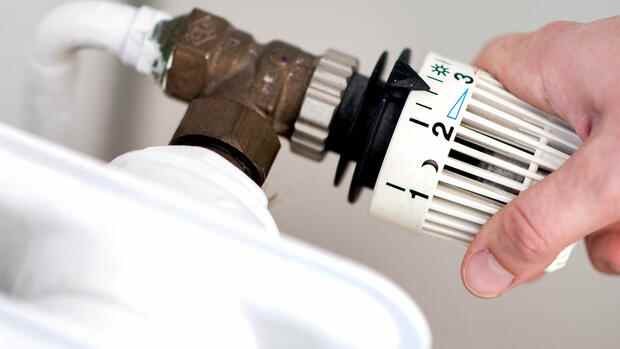According to the wishes of the FDP, tenants should bear the CO2 price alone.
(Photo: dpa)
Berlin A dispute has broken out in the traffic light coalition over the planned distribution of the CO2 price for heating costs between landlords and tenants. The reason is that the FDP, because of the energy crisis, considers it unacceptable to start charging landlords as early as next year.
“It’s not a question of whether and how the CO2 costs will be shared, but when,” said Daniel Föst, spokesman for building and housing policy for the FDP parliamentary group in the Bundestag, the Handelsblatt. “In the current situation, however, we are wondering whether we can burden small private landlords in particular with the additional effort,” he continued. “We are currently discussing this openly in the coalition.”
Objection comes from the Greens. “Repeatedly delaying laws, as the FDP is currently doing, is not an acceptable political style in the winter of crisis,” Christina-Johanne Schröder, spokeswoman for housing for the Greens in the Bundestag, told the Handelsblatt.
The traffic light government had planned that from next year landlords would pay part of the CO2 price for heating costs – and the more so, the less climate-friendly their house is. Federal Ministers Robert Habeck (Greens), Klara Geywitz (SPD) and Marco Buschmann (FDP) agreed on this in April. The cabinet had approved in May.
Top jobs of the day
Find the best jobs now and
be notified by email.
The Bundestag dealt with the draft law for the first time in September. According to the original plans, the law should be passed in October.
FDP: Avoid unnecessary effort
The FDP politician Föst pointed out that the energy crisis, cost shocks and inflation are currently making for a difficult environment. That is why the coalition has also agreed on a moratorium on stress. “As agreed in the traffic light, we should now avoid everything that causes unnecessary effort,” emphasized the FDP politician.
Green politician Schröder countered: “Anyone who lives as a tenant in apartments with poor windows, doors, insulation and heating often does not have a high income and is therefore doubly affected by the price increases for heating energy,” she said. Because currently the burden of the CO2 price would be borne exclusively by the tenants. The CO2 cost allocation law redistributes the burden between tenants and landlords “a little bit, thus creating more justice and providing an incentive for low-threshold renovations”.
Since 2021, a price has been charged for carbon dioxide (CO2) emissions in Germany. Since then, heating has become more expensive for most people because the majority of households in this country heat with fossil fuels such as gas or oil.
A ten-step model should apply to the division of costs between tenants and landlords. For houses with very high greenhouse gas emissions per square meter, landlords would therefore pay 90 percent of the CO2 price, with very low emissions tenants would have to bear the costs themselves. This should encourage landlords to make energy-saving renovations and tenants to save energy. The CO2 price is therefore a kind of climate tax that is intended to help reduce climate-damaging carbon dioxide emissions.
In view of the energy crisis and the search for ways to relieve people, the housing industry called for the CO2 price to be suspended for the duration of the crisis as early as September. The energy prices are so high that a CO2 price cannot have a steering effect for additional energy-saving behavior or investments in energy-efficient buildings, said Axel Gedaschko, President of the Central Association of the Housing Industry (GdW).
>> Read here: The government wants to split the CO2 price between tenants and landlords
The division plans are viewed critically by the Union as well as by homeowners. During the first debate on the topic in the Bundestag, CSU MP Ulrich Lange spoke of “bureaucratic madness” for landlords. The regulation is also not fair. “If more heating is used, even with the window open, the landlord takes on the higher share of the CO2 costs,” he complained. There is no incentive to save energy. In addition, the federal government is playing tenants against landlords.
140 euros CO2 costs per year in a poorly insulated apartment
The CDU building politician Jan-Marco Luczak criticized that the renovation status of a building plays no role in the plans. “The cost allocation is based on fuel consumption,” he explained. In the case of particularly frugal tenants, fuel consumption falls and a building is classified in a better category. As a result, the expense ratio for tenants even increases.
Due to rising gas prices, the homeowners’ association Haus und Grund generally rejects the state demanding a CO2 price. The association argued that a waiver would be better than further relief packages. Alternatively, an equal amount of money could be returned to the citizens.
Since the beginning of 2021, 25 euros per tonne of CO2 have been due. The increase of five euros per tonne of CO2 planned for January 2023 has already been suspended for a year. This is what the government’s third relief package provides for.
According to Haus und Grund, residents of a poorly insulated three-room apartment currently pay 140 euros in CO2 costs per year. “If the state foregoes this income, it would help the affected households a lot.” The steering effect of the already high gas price would remain.
More: This is how private households can still save gas at the moment

